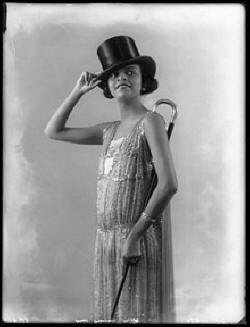

Queer Places:
Woodlawn Cemetery, Bronx
 Florence
Mills (born Florence Winfrey; January 25, 1896 – November 1, 1927),[1]
billed as the "Queen of Happiness", was an African-American cabaret singer,
dancer, and comedian known for her effervescent stage presence, delicate
voice, and winsome, wide-eyed beauty.
Florence
Mills (born Florence Winfrey; January 25, 1896 – November 1, 1927),[1]
billed as the "Queen of Happiness", was an African-American cabaret singer,
dancer, and comedian known for her effervescent stage presence, delicate
voice, and winsome, wide-eyed beauty.
A daughter of formerly enslaved parents, Nellie (Simon) and John Winfrey, she was born Florence Winfrey in 1896 in Washington, D.C. She began performing as a child. At the age of six she sang duets with her two older sisters, Olivia and Maude.[2] They eventually formed a vaudeville act, calling themselves the Mills Sisters.[3] The act did well, appearing in theaters along the Atlantic seaboard. Florence's sisters eventually quit performing, but Florence stayed with it, determined to pursue a career in show business. She joined Ada Smith, Cora Green, and Carolyn Williams in the Panama Four, which had some success. She then joined a traveling black show, the Tennessee Ten, in which in 1917 she met the dance director and acrobatic dancer Ulysses "Slow Kid" Thompson (1888–1990), to whom she would be married from 1921 until her death.[4][5][6]
Mills became well known in New York as a result of her role in the successful Broadway musical Shuffle Along (1921) at Daly's 63rd Street Theatre (barely on Broadway), one of the events marking the beginning of the Harlem Renaissance. She received favorable reviews in London, Paris, Ostend, Liverpool, and other European venues. She told the press that despite her years in vaudeville, she credited Shuffle Along with launching her career.[3]
After Shuffle Along, Lew Leslie, a white promoter, hired Mills and Thompson to appear nightly at the Plantation Club. The revue featured Mills and a wide range of black artists, including visiting performers such as Paul Robeson. In 1922, Leslie turned the nightclub acts into a Broadway show, The Plantation Revue. It opened at the Forty-Eighth Street Theatre on July 22. The English theatrical impresario Charles B. Cochran brought the Plantation company to London, and they appeared at the London Pavilion in spring 1923 in a show he produced, Dover Street to Dixie, with a local all-white cast in the first half and Mills starring with the all-black Plantation cast in the second half.[6][7]
In 1924 she headlined at the Palace Theatre, the most prestigious booking in vaudeville, and became an international star with the hit show Lew Leslie's Blackbirds (1926).[8] Among her fans when she toured Europe was the Prince of Wales, who told the press that he had seen Blackbirds 11 times.[9]
Many in the black press admired her popularity and saw her as a role model: not only was she a great entertainer but she was also able to serve as "an ambassador of good will from the blacks to the whites... a living example of the potentialities of the Negro of ability when given a chance to make good".[10]
Mills was featured in Vogue and Vanity Fair and was photographed by Bassano's studios and Edward Steichen. Her signature song was her biggest hit, "I'm a Little Blackbird Looking for a Bluebird". Another of her hit songs was "I'm Cravin' for that Kind of Love".
Exhausted from more than 300 performances of the hit show Blackbirds in London in 1926, she became ill with tuberculosis. She died of infection following an operation at the Hospital for Joint Diseases in New York City, New York on November 1, 1927. She was 31 years old. Most sources, including black newspapers, such as the Chicago Defender and the Pittsburgh Courier, and mainstream publications, including the New York Times and the Boston Globe, reported that she died of complications from appendicitis.[11]
Her death shocked the music world. The New York Times reported that more than 10,000 people visited the funeral home to pay their respects;[12] thousands attended her funeral, including James Weldon Johnson, president of the National Association for the Advancement of Colored People, and stars of the stage, vaudeville and dance. Honorary pall bearers including singers Ethel Waters and Lottie Gee, both of whom had performed with Mills. Dignitaries and political figures of both races sent their condolences.[13] She is buried at Woodlawn Cemetery, in Bronx, New York.[14]
Her widower, Ulysses Thompson, a native of Prescott, Arkansas, was a dancer and comedian, having learned his trade in the tough world of circuses and traveling medicine shows in the early years of the century. He subordinated his career to hers, acting as her manager, promoter, minder and companion. After her death, he continued performing, traveling around the world, including appearances in China and Australia, until the late 1930s. He later married Gertrude Curtis, New York's first black woman dentist (1911) and the widow of the lyricist Cecil Mack (born as Richard Cecil McPherson). Thompson outlived both of his wives; he died in 1990, at the age of 101, in Little Rock, Arkansas.
My published books: